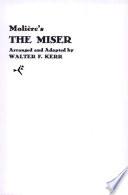
“One must eat to live, and not live to eat.”
Il faut manger pour vivre, et non pas vivre pour manger.
L'Avare (1668), Act III, sc. i.
Firstly, an inaccurate sourcing: in Act III, yes—but in Scene I, no: rather, in Scene V—HARPAGON, VALÈRE, MASTER JACQUES (see, e.g., the Project Gutenberg HTML version of the English translation: http://www.gutenberg.org/files/6923/6923-h/6923-h.htm). Secondly, a misattribution made clear by the Molière text—the character in the play, VAL, obviously points out that the quote refers to a "saying of one of the ancients" (and the quote is precisely written in quotation marks as well), in the full line of dialogue below:
Know, Master Jacques, you and people like you, that a table overloaded with eatables is a real cut-throat; that, to be the true friends of those we invite, frugality should reign throughout the repast we give, and that according to the saying of one of the ancients, "We must eat to live, and not live to eat."
The "ancients" to which VAL/Molière refers is Cicero, Diogenes Laertius, and the oldest known attribution, Socrates (whom Laertius explicitly attributes—and Cicero presumably invokes). Various books of quotations document this—e.g., Elizabeth Knowles' 2006 The Oxford Dictionary of Phrase and Fable (http://books.google.com/books?id=r2KIvsLi-2kC&dq=%22one+must+eat+to+live+not+live+to+eat%22&source=gbs_navlinks_s) and Jennifer Speake's 1982 A Dictionary of Proverbs (http://books.google.com/books?id=-IpkOkM3IfEC&dq=%22one+must+eat+to+live+not+live+to+eat%22&source=gbs_navlinks_s): the former lists the quote as "a proverbial saying, late 14th century, distinguishing between necessity and indulgence; Diogenes Laertius says of Socrates, 'he said that other men live to eat, but eats to live.' A similar idea is found in the Latin of Cicero, 'one must eat to live, not live to eat'"; the latter, reiterates this. Moreover, in William Shepard Walsh's 1909 Handy-book of Literary Curiosities, he adds that "According to Plutarch, what Socrates said was, 'Bad men live that they may eat and drink, whereas good men eat and drink that they may live.'" He also adds that Atheneus quotes similarly to Laertius, as well as explores other later variations (http://books.google.com/books?id=hrJkAAAAMAAJ&source=gbs_navlinks_s).
Misattributed
